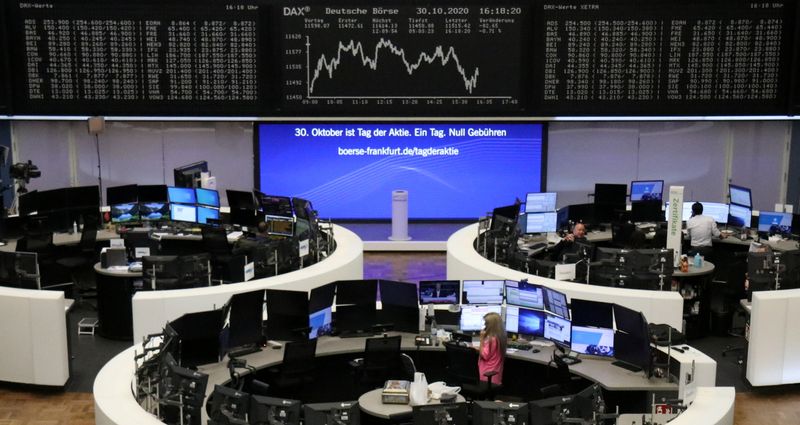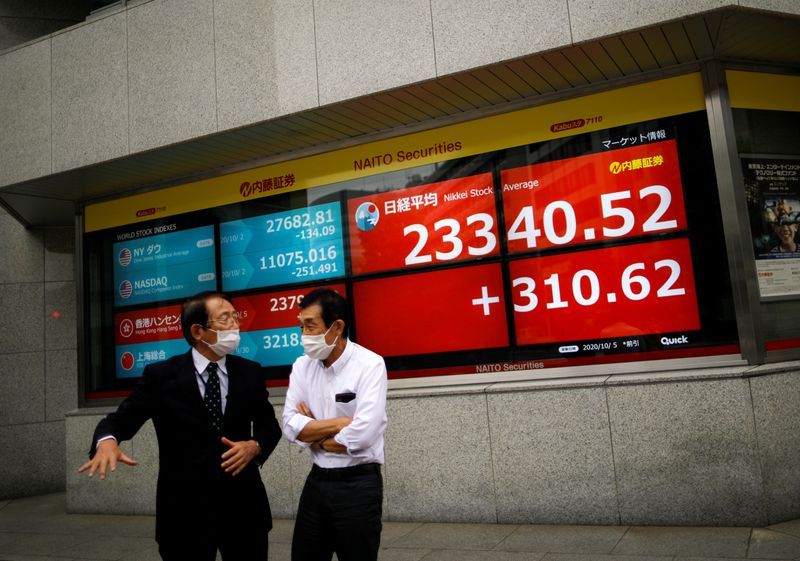By Danilo Masoni
MILAN (Reuters) - World shares recovered from one-month lows on Monday as strengthening factory data in China and Europe offset news of new virus lockdowns, while investors prepared for more volatility arising from the U.S. presidential election.
The MSCI world equity index (MIWD00000PUS), which tracks shares in 49 countries, was up 0.4% by 1047 GMT, following a strong performance in Asia after data showed Chinese factory activity expanded at its fastest pace in a decade.
A strong bounce in euro zone manufacturing in October also helped Europe leave behind a cautious start after the UK became the latest country in the region to announce a fresh lockdown to fight a second wave of COVID-19 infections.
Italy was also set to approve new restrictions as early as Monday after moves in France and Germany last week caused a broad risk-off move across markets.
The pan-European FTSEurofirst 300 (FTEU3) benchmark, which reached a five-month low last week, was last at its session high, up 1.1%, also supported by hopes the lockdowns wouldn't last as long as the previous round.
"Europe is facing up to a harsh winter ahead," Deutsche Bank (DE:DBKGn) strategist Jim Reid said in a note. "The question to be asked to all the European countries is can they come out of these measures in some form towards the end of November/early December as is hoped or will they be extended further."
The focus was increasingly shifting towards the U.S. election on Tuesday, although investors prepared for the chance that it could take a few days before the result becomes clear.
Republican President Donald Trump trails Democratic challenger Joe Biden in national opinion polls, but polls in the states that will decide the election show a closer race.
"Given the likelihood that the outcome of the presidential election will be unclear on Wednesday, and possibly for much longer, volatility could easily pick up and it might become a severe roller-coaster ride," UniCredit strategists said.
Analysts are concerned that an uncertain outcome could cloud the prospects for fiscal stimulus in the world's largest economy. Also crucial for the size of a possible stimulus will be which party wins the Senate.
The VIX volatility index (VIX), which rose to its highest in four months last week, eased nearly 1 point to 37.3. U.S. stock index futures (ESc1) (NQc1) were more than 1% higher, suggesting a clear recovery on Wall Street at the open.
Meanwhile, the fresh lockdowns in Europe and parts of the United States have raised concerns over the outlook for fuel consumption. Brent crude (LCOc1) prices fell to a low of $35.74 per barrel, a level not seen since late May. They were last down 2.4% at $37.05. U.S. crude went as low as $33.64. [O/R]
Global coronavirus cases surged last week with Europe crossing the bleak milestone of 10 million total infections. The UK is grappling with more than 20,000 new cases a day while a record surge in U.S. cases is killing up to 1,000 people a day.
In currencies, the British pound
The risk-sensitive Australian dollar
That left the index that measures the dollar against a basket of other currencies broadly unchanged at 94.06. (=USD).
A risk-on revival after the U.S. election could see the dollar resume its slide from March's highs, analysts said.

JPMorgan (NYSE:JPM) said the market probably views a Biden win as "short-term neutral" but "long-term negative" as his expected tax policy outweighs the benefits from a large stimulus package.
